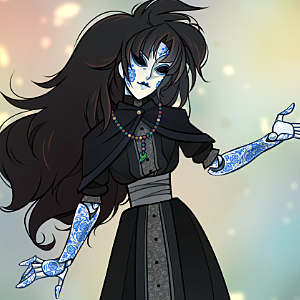| COUNTESS-4 | ||
|
||
| STORY | ||
| Countess-4 is a creation of a yanta manufacture
program conceived late in the Gate War. While early war production
was concentrated on turning out basic, interchangeable
food-soldiers, Countess-4 harkens back to the first yanta which
were bespoke works of the artificer�s craft. It was assembled and
given life at the Grandee anima mill in the city of Kaara, a
hotbed of cutting-edge experimentation by Baltine Artificers.
Undisclosed special processes and materials were incorporated in
its design and construction, with the intent to make a uniquely
capable warrior. After its creation, Countess-4 was given standard training for yanta soldier models. Rigorous proving followed to explore the extent of its magical abilities. Because divine magic use was difficult to reliably manufacture, its abilities were considered something of a breakthrough in this regard. There are no records of Countess-4�s activities during the closing days of the Gate War. At some point, possibly as part of the Treaty of Means and Endings, it was inactivated for long-term storage. Countess-4 was purchased in YD 6997 by Serevey Snakewisdom as a safeguard against an assassination attempt he (correctly) believed was plotted by the Marchioness Sebastienne Goethe. Despite expending considerable wealth and calling on high-level connections within the Free States for this bodyguard, the beastkin mystic never activated it until he was personally warned of the danger by the travelers involved in the death of the Marchioness. It was tasked by Serevey to accompany and protect these travelers, as he believed they were important to foiling the Marchioness� continued plans and ensuring his own safety. |
||
| PERSONALITY | ||
| Unlike some yanta who have become more
expressive over time, Countess-4 retains a chilly, mechanical
aspect to its personality. However, it is no emotionless
automaton. The precise savagery it exhibits in battle might be
unfettered by remorse, but is conducted with a certain
satisfaction and pleasure in its bloody work. In social settings, it frequently cuts to the heart of the matter, and doesn�t hesitate to rebuke or ignore frivolous distractions. Sometimes, a bit of smugness can be detected in its over-simplification of matters. While Countess-4 can call upon divine power in the name of the pantheon of Geb, it does not seem to carry out the usual devotion of any priesthood. In fact, its coldly murderous pragmatism seems often to mock the laws of the gods. Whether this is truly a triumph of craftsmanship on the part of its creators, or some strange perversion of artificing is not known. |
||
| APPEARANCE | ||
| Where most yanta are prosaic in construction
with their sturdy wood and metal frames, Countess-4�s body is a
masterpiece of art. Molded to resemble a slender human woman, it
is composed of bone-meal ceramic, painted with blue floral
designs. The only hint of its internal mechanisms can be seen at
the exposed joints. Countess-4 has armor integrated, but this is
only detectable in rims of metal plate at the edges of its ceramic
paneling. Its face is cast as an immobile mask and its eyes are two black hollows. In a touch of whimsy that feels sinister the more one considers, it was given a full head of long, slightly wavy black hair. The donor for the hair is not known. Countess-4 dresses in a simple black cassock resembling the garb of a Baltine religious scholar. |
||
| OTHER / TRIVIA | ||
| > Since its manufacture Countess-4 has
carried a set of burnt and melted prayer beads. The significance
of the beads is unknown, but they are of a style particular to
worship of the pantheon of Geb in northern Baltine states. > The fighting style used by Countess-4 is a rare one, using a double-scimitar weapon depicted in ancient Samrat art. It is possible that this is a clue to the background and design philosophy of its creators. |
